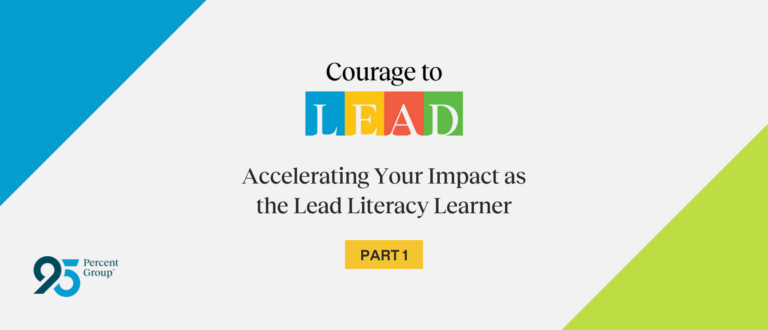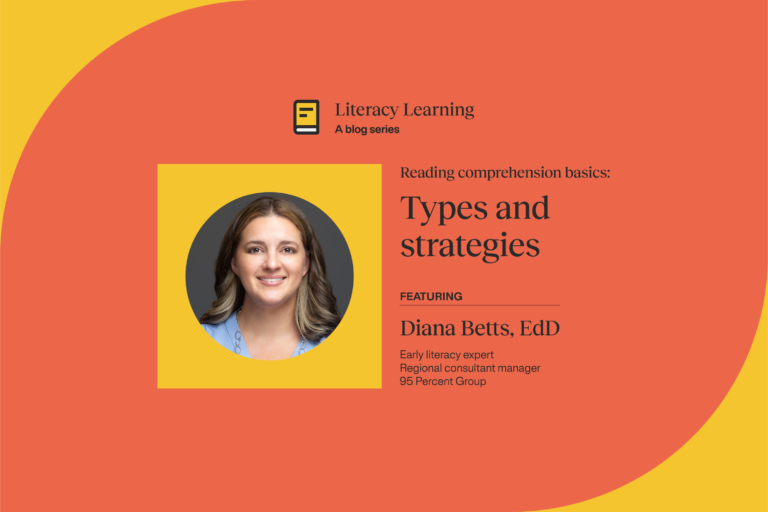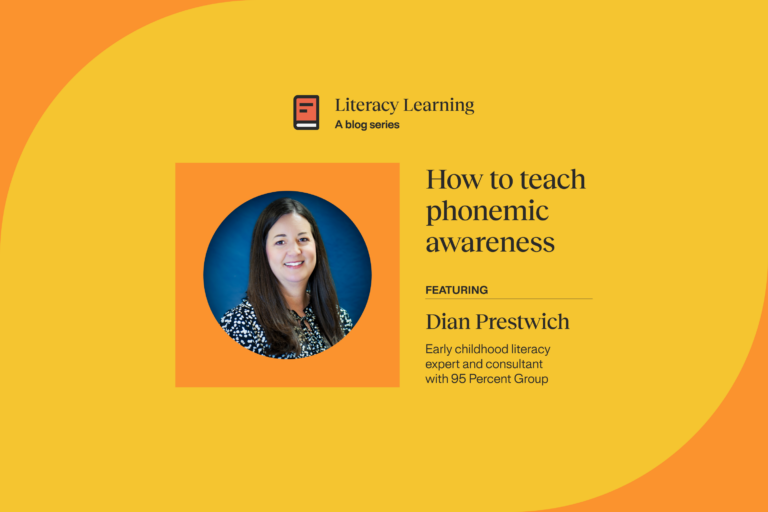Courageous leaders: Accelerating your impact as the lead literacy learner with Laura Stewart and Mitchell Brookins (Part 1 of 3)

Laura Stewart, Chief Academic Officer at 95 Percent Group, spoke with educational consultant Mitchell Brookins, PhD, recently in the Courageous Leaders Webinar Series. Dr. Mitchell Brookins is an educational consultant who supports teachers, school administrators, and district leaders in advancing student academic attainment. His 18 years of professional experience include teacher, instructional coach, school administrator, district leader, consultant, and educational thought leader in K-12.
Laura Stewart:
Mitchell, I think the best place to start is to have you tell us about your journey and what has led you to focus on leadership—why you became an educator, where you’ve taught and led, and maybe some of the lessons you’ve learned along the way.
Mitchell Brookins:
My mother nurtured my love of teaching. I was the child who wanted gifts from the teacher store. That’s how I got excited and how I felt affirmed. I started at age 14 teaching Vacation Bible School. I did that for two years. Then, at the age of 16, I began teaching the Sunday School class for the eight- and nine-year-olds—that’s when I knew that I wanted to be an elementary school teacher. So I then matriculated to Illinois Wesleyan University, where I received my bachelor’s degree in elementary education.
During the last year, they asked us if we wanted to be a part of a pilot program. My university was about 3 hours south of Chicago, and they had a pilot program in Chicago for Urban Education, so I did my student teaching on the south side of Chicago. Lo and behold, it’s a third grade classroom. And what do I find out in the first 30 days? The teacher, the lead teacher in the room, is now about to retire because she’s been teaching for 30 years. They were looking for a teacher of third grade for the year afterwards. And here I am, the student teacher, right? I wanted that job, and I did everything that I could to show that I was serious about instruction. I’ll never forget Mrs. Mooney—at the end of her year as a teacher, she said she knew that the school was in good hands.
I was a third grade teacher my first year, and I will tell anyone the happiest time of my life is touching children. So that’s how I got my start. I understand that it’s a mission. It’s a calling. This is my life’s work.
Laura Stewart:
What made you focus on literacy as you carried on with your journey?
Mitchell Brookins:
I can go in multiple directions to answer that question. But I would say the reason why I focus on literacy is really my experience in schools. I have spent the majority of my career in turn-around schools. Some of us call them low-performing schools. Those are terms that people use. I focus on literacy because I was sick and tired of seeing children who looked like me not achieving, not attaining the most essential skill…
My point here is that when you’re a school leader and you think about the needs of your schools, I had to realize that in so many of the schools that I’ve led, children were not reading proficiently. I had no choice but to focus on literacy. If I’m going to lead a school…I just believe that in society, parents send their kids to school, and the expectation is for them to learn how to read…We don’t think that anyone should leave eighth grade and not be able to read a text. And so, for me, as a literacy leader, I just ensure that my focus will be on what children need the most. That’s how I got into literacy.
What has impassioned me is a concept by Gloria Ladson-Billings. She talks about how we should stop calling things an achievement gap but recognize that it’s an educational debt. When I read that, it moved my soul. I thought about how we have 30 years of data showing that the school systems have not fulfilled their promise. When we think about Brown v. Board of Education in 1954, we’re talking about decades in which the promise was educational equity, and we’ve yet to deliver upon that.
And so I am impassioned about literacy because I understand there is an invoice that has not been paid. That educational debt is something that I just believe that we owe to children because we’ve yet to get that right. It’s not acceptable that we still have this debt. So, I have a mindset that this work is about paying it back.
Laura Stewart:
I hear from other educators that they feel that they were ill-prepared to do their most important work. They have a sense of guilt. We have to let go of that shame and blame. How do we allow ourselves to be vulnerable enough in our profession to reconcile what we did in the past with what we want to do and what we know we can do now?
Mitchell Brookins:
Let’s put on the table the trauma that children experience at the early age of even five-years-old. When you cannot read, even in kindergarten, I think sometimes we think, “Oh, they’re just five. They don’t get it.” Children get it! We have documented evidence now that shows that we have so many kids who are leaving kindergarten with a deficit mindset about themselves and what they can do, and it is linked to the fact that every day they’ve been coming to school, they’re not getting it.
So, when I say educational debt, I also think about all of those kids that have been left behind. I think about even the child—some have heard this story from me—when, as a school administrator, a fifth grader came to me and said, “I want to be like everybody else, and I want to learn how to read.” As the leader of that school, I had to step back and take a moment and say, “I owe you that much. You don’t deserve to be in fifth grade and not able to read. My school has failed you, and I have failed you as a leader.” I remember telling that young boy that day that I decree that you will no longer be illiterate. And here’s what’s funny—he’s still texting me, even as of yesterday. Now he calls me Dr. Brookins, right? I do this work because I’m not ashamed or afraid to call out that I know the system has failed.
I know that I’m a part of that system, and I can’t just say, Oh, the system! the system! It’s the system. No, I am the system. That’s why I’m impassioned about it. I know that I’ve done some malpractice. I know that I was teaching people about guided reading. I know that I was at Lucy Calkin’s Coaching Institute. I know that…All of the guided readings and workshop books by Fountas and Pinnell. I know that, I did that and so Mitchell has a debt that is owed to children.
We have to let go of the shame so that we can actually do the work, right? You can’t walk in this work being guilty. You can’t walk into this work being shamed with your head down. You have to empower yourself and say, Yes, I did wrong, and I’m going to right that wrong. I find that we have people who are battling that right now. They don’t want to be blamed. They’re worried about being blamed. And honestly, the moment that I blamed myself and took accountability for what I did is when the transformation happened within me.
Laura Stewart:
Why do you think we haven’t gotten this right? If we do believe all means all, then we have to deliver on this promise. Otherwise, we’re blaming the kids, and we can’t do that.
Mitchell Brookins:
I think we’ve institutionalized failure so much that I don’t even know if people even recognize the low expectations and the belief systems that have gotten in our way because if you’ve never seen above 50 percent reading on grade level, if you’ve never seen above 80 percent, you don’t even know what that looks like. And I’m really grateful, Laura, that in my teaching career, I can say that 70 percent of my class was black, and the other 30 percent was Hispanic, Vietnamese, and white. And guess what? I had classes that went from 50 percent passing state tests on writing to 100 percent, classes where it started at 75 and 60, classes that started at 20 percent and moved to 60 percent. I’ve had those experiences so for me, it’s hard for me to undo that. So I share that because sometimes I think, “Are we so used to failure that we can’t even see that our history is now impeding our mindsets and what we can do in the future?”
How do we change some of this? I think first, it has to start with ourselves. We have to say enough is enough. We have to be able to say that it is unacceptable. People probably hate this word, but our literacy rates are trash. It’s true and we’ve gotta be okay with saying that this is not supposed to be.
I think that to me, that is the first step of us moving in the different direction of saying that this is not okay. Time for a change.
Ready for part 2?
Click here to read now!
About 95 Percent Group
95 Percent Group is an education company whose mission is to build on science to empower teachers—supplying the knowledge, resources and support they need—to develop strong readers. Using an approach that is based in structured literacy, the company’s One95™ Literacy Ecosystem™ integrates professional learning and evidence-based literacy products into one cohesive system that supports consistent instructional routines across tiers and is proven and trusted to help students close skill gaps and read fluently. 95 Percent Group is also committed to advancing research, best practices, and thought leadership on the science of reading more broadly.
For additional information on 95 Percent Group, visit: https://www.95percentgroup.com.



